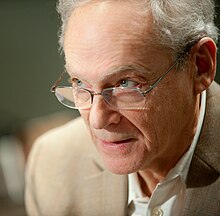Richard Marc Losick (/ˈloʊsɪk/ LOH-sik;[1] born 1943) is an American molecular biologist. He is the Maria Moors Cabot Professor of Biology at Harvard University[2] and a professor at the Howard Hughes Medical Institute.[3] He is especially noted for his investigations of endospore formation in Gram positive organisms such as Bacillus subtilis.
Richard Losick | |
|---|---|
 | |
| Born | 1943 |
| Education | Princeton University, MIT |
| Known for | Investigating endospore formation in Gram positive organisms |
| Awards | National Academy of Sciences, American Academy of Arts and Sciences, American Association for the Advancement of Science, American Academy of Microbiology, American Philosophical Society, Selman A. Waksman Award in Microbiology |
| Scientific career | |
| Fields | Molecular Biology |
| Institutions | Harvard University, Howard Hughes Medical Institute |
Education and career
editLosick received his AB in Chemistry from Princeton University in 1965, and his PhD in biochemistry from Massachusetts Institute of Technology in 1969.[4] Following his graduate studies, Losick was named a Junior Fellow of the Harvard Society of Fellows. He joined the Harvard faculty in 1972.[5] He has held the position of chairman in the Departments of Cellular and Developmental Biology and Molecular and Cellular Biology.[6] Along with Daniel Kahne, Robert Lue, and Susan Mango, he teaches Life Sciences 1a, an introductory biology and chemistry course, which was the fourth largest lecture course taught at Harvard College in 2015.[7]
Research
editLosick's research interests include RNA polymerase, sigma factors, regulation of gene transcription, and bacterial development. He is known for his studies of asymmetric division in Bacillus subtilis, which divides to form one endospore and one nurturing cell.[6] Currently, Losick studies biofilm formation by the opportunistic pathogen Staphylococcus aureus. His research group has demonstrated that chromosomal DNA is recycled to form an electrostatic extracellular net in order to hold neighboring bacterial cells together.[8]
Awards and honors
edit- Camille and Henry Dreyfus Teacher-Scholar Award, The Camille and Henry Dreyfus Foundation (1973)[9]
- Member, National Academy of Sciences (1992)[10]
- Member, American Academy of Arts and Sciences (1996)[11]
- Member, American Association for the Advancement of Science (1998)[12]
- Fellow, American Academy of Microbiology (elected prior to 2000)[6][when?]
- Visiting Fellow, Phi Beta Kappa (2000)[5]
- Member, American Philosophical Society (2005)[13]
- Selman A. Waksman Award in Microbiology, National Academy of Sciences (2007)[14]
- Gairdner Foundation International Award (2009)[6]
- Louisa Gross Horwitz Prize, Columbia University (2012)[15]
References
edit- ^ "Richard Losick (Harvard) Part 3: Stochasticity and Cell Fate". YouTube. Archived from the original on 2021-12-18. Retrieved 7 September 2019.
- ^ "Faculty Profile: Richard M Losick". Harvard University. Retrieved 29 October 2016.
- ^ "Our Scientists: Richard M. Losick, PhD". Howard Hughes Medical Institute. Retrieved 29 October 2016.
- ^ "Richard Losick: Developmental Biology of a Simple Organism - Speaker Bio". iBiology. Retrieved 29 October 2016.
- ^ a b "Harvard biologist lectures as Phi Beta Kappa Visiting Scholar". Cornell College News Center. Cornell College. 6 September 2000. Retrieved 22 April 2019.
- ^ a b c d "Richard Losick". Les Prix Canada Gairdner Awards. Retrieved 22 April 2019.
- ^ Rodman, Melissa C. (14 September 2015). "Ec 10 and CS50 Compete for Largest Enrollment Numbers". The Harvard Crimson. Retrieved 22 April 2019.
- ^ "Research". Richard Losick. Retrieved 22 April 2019.
- ^ "Camille Dreyfus Teacher-Scholar Past Awards" (PDF). Dreyfus Foundation. Retrieved 22 April 2019.
- ^ "Richard M. Losick". National Academy of Sciences. Retrieved 22 April 2019.
- ^ "Book of Members 1780-2017, Chapter L" (PDF). American Academy of Arts & Sciences. Retrieved 22 April 2019.
- ^ "Historic Fellows". American Association for the Advancement of Science. Retrieved 22 April 2019.
- ^ Hopkin, Karen (13 June 2005). "Richard Losick Elected to American Philosophical Society". Harvard Molecular & Cellular Biology. Retrieved 22 April 2019.
- ^ "Selman A. Waksman Award in Microbiology". National Academy of Sciences. Retrieved 22 April 2019.
- ^ "Horwitz Prize Awardees". Columbia University Medical Center. 20 June 2018. Retrieved 22 April 2019.
External links
edit- Research Summary & Profile, Harvard University
- Biography of Richard M. Losick on the Howard Hughes Medical Institute site